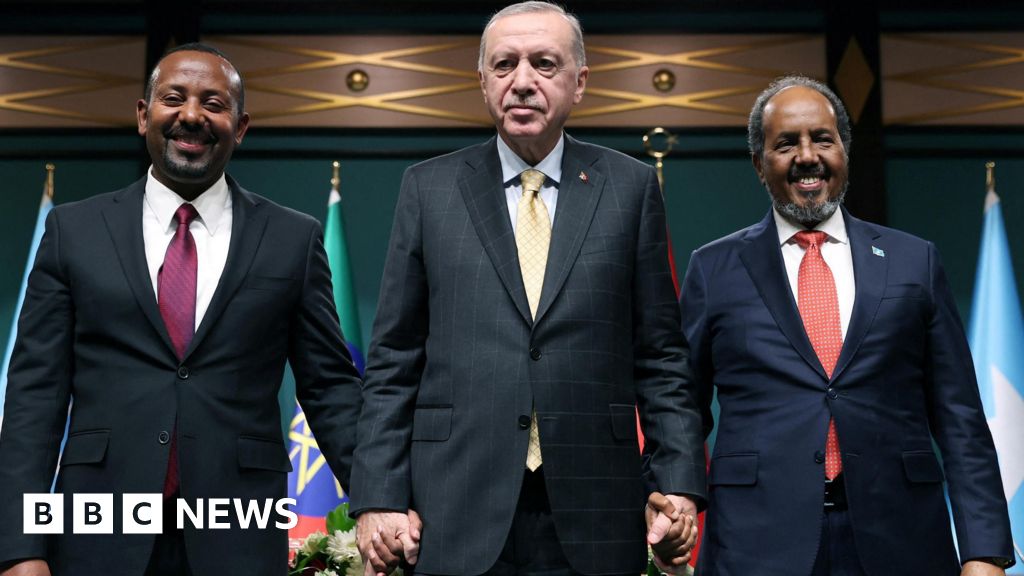You are using an out of date browser. It may not display this or other websites correctly.
You should upgrade or use an alternative browser.
You should upgrade or use an alternative browser.
Does Ethiopia 🇪🇹 want to go to war with Somalia 🇸🇴 to secure ocean access?
- Thread starter ☑︎#VoteDemocrat
- Start date
More options
Who Replied?
Ethiopia and Somalia reach deal in Turkey to end Somaliland port feud
Ethiopia's deal to build a port in Somaliland had infuriated Somalia, prompting fears of wider conflict.
Ethiopia and Somalia agree to end bitter Somaliland port feud
9 hours ago
Kalkidan Yibeltal in Addis Ababa & Basillioh Rukanga in Nairobi
BBC News
Reuters Turkish President Erdogan (centre) holds hands with Somali President Hassan Sheikh Mohamud (right) and Ethiopian Prime Minister Abiy Ahmed (left) - all in suits and ties - posing for the cameras after a press conference in Ankara, Turkey - 11 December 2024Reuters
President Recep Tayyip Erdogan (C) said the agreement was "the first step towards a new beginning"
Ethiopia and Somalia have agreed to end their bitter dispute over Addis Ababa's plans to build a port in the breakaway republic of Somaliland following talks in Turkey.
Turkish President Recep Tayyip Erdogan welcomed the "historic agreement", which he said would eventually ensure landlocked Ethiopia's access to the sea.
At the press conference he held hands with Ethiopian Prime Minister Abiy Ahmed and Somali President Hassan Sheikh Mohamud, who both agreed to respect one another's "sovereignty".
The two neighbours have been at loggerheads since January when Ethiopia signed a maritime deal with Somaliland - which Somalia considers as part of its territory.
It prompted fears of a wider regional conflict as Egypt has been backing Somalia - largely due to its anger with Ethiopia for building a dam on the River Nile.
Turkey has in recent years become an important geopolitical player in the Horn of Africa as it has close economic ties with Addis Ababa and security deals with Mogadishu.
Ethiopia-Somaliland deal: Can the Horn of Africa rift be healed?
Ethiopia warns against invasion amid regional tensions
Why Ethiopia is so alarmed by an Egypt-Somalia alliance
Erdogan said the agreement - announced on Wednesday night in the Turkish capital, Ankara - was "the first step towards a new beginning".
"I congratulate both my brothers for reaching to this historic reconciliation with devotion and thank them for their constructive attitude," he said.
President Mohamud said his country was "ready to work with the Ethiopian leadership and the Ethiopian people".
While Prime Minister Abiy insisted Ethiopia's efforts to secure and reliable access to the sea did not threaten Somalia and the two had "addressed the misunderstandings that have occurred over the past year".
The feud began on New Year's Day, when Abiy signed a controversial deal with Somaliland to lease a 20km (12-mile) section of its coastline for 50 years to set up a naval base.
In exchange, Ethiopia - the world's most-populous landlocked nation - was to reportedly recognise Somaliland as an independent country, although Addis Ababa never explicitly confirmed this.
Somaliland, which broke away from Somalia more than 30 years ago, has long been pushing for recognition - but Mogadishu described the move as an act of "aggression".
According to the Ankara joint declaration, the two Horn of Africa neighbours are to reconvene in February to hold "technical talks".
In the interim they will strive to reach "mutually beneficial commercial arrangements" to ensure Ethiopia gains access to the sea "under Somalia's sovereignty".
It is not clear if Ethiopia has discarded the deal it signed with Somaliland - something demanded by Somalia at earlier mediation efforts.
Last month, Somaliland elected a new president - former opposition leader Abdirahman Mohamed Abdullahi - who promised to "review" the maritime deal.
During his inauguration speech on Thursday morning he made no mention of it.
Somaliland is located in a strategic part of the world, and is seen as a gateway to the Gulf of Aden and the Red Sea.
Additional reporting by Bidhaan Dahir in Hargeisa.

Inside the Turkey-backed Somalia-Ethiopia deal
Seven-hour negotiations in Ankara produced a joint statement that satisfied Mogadishu
 www.middleeasteye.net
www.middleeasteye.net
Inside the Turkey-backed Somalia-Ethiopia deal
Summarize
When Somali President Hassan Sheikh Mohamud and Ethiopian Prime Minister Abiy Ahmed met in Ankara on Wednesday, expectations from their Turkish hosts were high.
The Turkish government had been attempting to mediate the sea port crisis between the two countries for almost a year through two rounds of negotiations, but no tangible progress had been made beyond vague statements of goodwill.
Mogadishu has been demanding that Ethiopia cancel a memorandum of understanding (MoU) it signed with Somalia's breakaway northern region of Somaliland in January. This agreement aimed to grant Ethiopia port access through Somaliland's coastline for the next 50 years.
Somalia viewed the MoU as a potential recognition of Somaliland as a sovereign state and threatened war to protect its territorial integrity. Ethiopia, in contrast, argued that as a landlocked country, it had a right to sea access under international law.
“You won’t leave this room until you reach a deal,” Turkish President Recep Tayyip Erdogan said during the negotiations, according to a person familiar with the issue speaking to Middle East Eye.
New MEE newsletter: Jerusalem Dispatch
Sign up to get the latest insights and analysis on Israel-Palestine, alongside Turkey Unpacked and other MEE newsletters
Erdogan, who has known both leaders for years, has invested heavily in Somalia since 2011. Turkey has established a military base in the country, trained thousands of Somali soldiers, managed Mogadishu’s airport and port, and provided extensive humanitarian and military aid.In 2021, Erdogan’s decision to sell Turkish armed drones to Abiy tipped the balance of Ethiopia’s civil war against the Tigray forces in Abiy's favour.
Sticking point
A Turkish official stated that the negotiations between the two leaders and their respective teams lasted nearly seven uninterrupted hours, with Erdogan and Turkish Foreign Minister Hakan Fidan actively participating.According to a source familiar with the talks, one of the key sticking points was Ethiopia's recognition of Somalia's territorial unity. This recognition would effectively require Ethiopia to cancel its MoU with Somaliland.
The source added that while Abiy was willing to sign a statement committing to Somalia’s independence and sovereignty, he resisted any mention of “territorial integrity” or “unity”.
The Somali delegation countered by referencing the 1933 Montevideo Convention, which codifies international legal norms and principles regarding statehood. One of its key criteria for statehood is the possession of a “defined territory”.
“You cannot say you recognise a country but deny that it has a defined territory,” the source explained.
Turkish officials found this argument persuasive, concluding that Ethiopia must either recognise Somalia in its entirety under international law or not at all.
Hours of negotiations later, Somalia and Ethiopia finally reached a final agreement, known as the Ankara Declaration, that addressed the core demands of both. Somalia secured Ethiopia’s recognition of its territorial unity, while Ethiopia was granted commercial access to the Somali coastline.
The declaration also stipulated that technical delegations from both nations, facilitated by Turkey, would begin negotiations no later than February 2025, with a deadline to complete the talks within four months. Turkish officials hailed the deal as a victory for both sides.
'Win-win agreement'
Ebuzer Demirci, a regional expert, noted that Somalia has emerged as achieving several deals.“Somalia, earlier this year, signed a comprehensive naval and energy deal with Turkey to guard its waters and establish a naval force with Ankara’s help,” Demirci said. “Mogadishu leveraged the Somaliland MoU to its advantage.”
The reasoning behind Abiy's concessions may be twofold.
Tom Gardner, an Africa correspondent for The Economist, suggested that Abiy was under significant diplomatic pressure from the United States to resolve the crisis.
“The US is concerned about the implications for security and peacekeeping in Somalia, particularly in the fight against al-Shabab [an al-Qaeda-affiliated militant group],” Gardner explained, noting that Ethiopia is a key contributor to African peacekeeping forces.
Under the new deal, Somalia confirmed that Ethiopian troops would remain in the country.
The situation was further complicated by Somaliland’s recent presidential elections, which shifted the political landscape. Somaliland’s new president, Abdirahman Mohamed Abdullahi, is reportedly less amenable to Abiy than his predecessor.
“Somaliland senses it might get a better offer, possibly in the form of recognition from the next US administration,” Gardner added. The news website Semafor reported this week that the incoming Donald Trump administration is already considering recognising the breakaway state.
Some analysts argue that Abiy achieved his primary objective, as he has long sought to address Ethiopia’s landlocked status. By triggering the crisis, he forced the issue to the forefront and secured a deal granting Ethiopia access to the Somali coast.
“It’s a sort of win-win agreement,” said Omar Mahmood, a senior analyst for Eastern Africa at Crisis Group. “This deal still provides Abiy Ahmed with access to the sea, and it makes sense for the Ethiopian market to be connected to the Somali coast.”